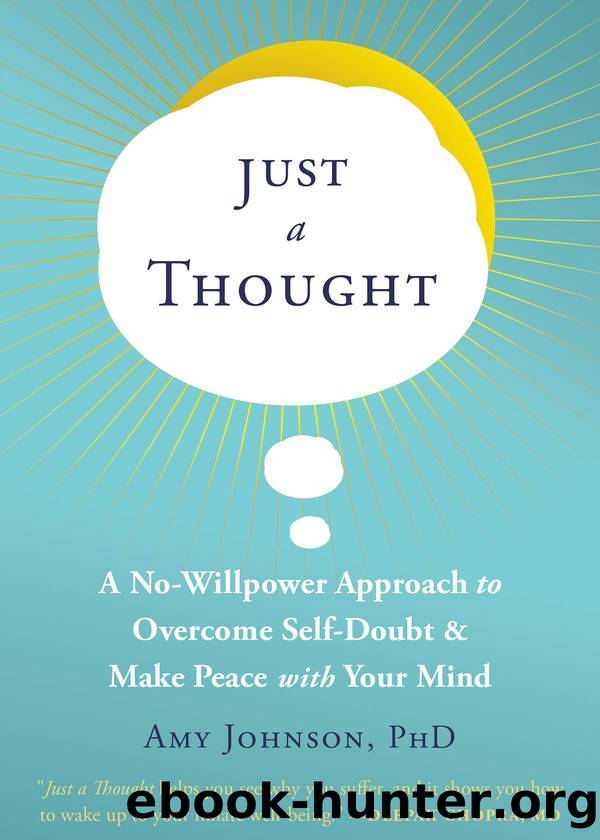Just a Thought by Amy Johnson

Author:Amy Johnson [Johnson, Amy]
Language: eng
Format: epub
ISBN: 9781684038183
Publisher: New Harbinger Publications
Published: 2021-08-05T21:47:40+00:00
What did you think in a moment in time that has stuck with you and now looks true?
Part II:
Thatâs Just What Minds Do
15. Minds Worry
I learned to worry at an early age.
My mom worried a lot, often aloud, and I had no clue that what she was worrying about wasnât real. You donât as a kid.
We were going to run out of money. Weâd have to eat canned soup every night. We were going to lose our house. My dad was going to get custody of me and my sister.
It was all completely real in my mind, and Iâm sure it was real in her mind too. But none of it was truly real. None of those things happened.
The things we worry about usually donât happen because worry isnât about whatâs happening in the outside world. Worry is our imagination creating dramatic stories and images that we confuse with reality.
Worry is the natural result of evolution. The modern human brain is about two hundred thousand years old, meaning, it evolved to survive in the environment humans lived in two hundred thousand years ago when survival was tenuous, at best. There were physical threats like famine, predators, and dangerous weather that required nearly nonstop present-moment focus. When a person felt fear two hundred thousand years ago, it was an adaptive response, alerting them to an immediate physical threat. There was a clear and obvious protective action to takeâwhen they took the action, the fear subsided. Scientists call this an immediate-return environment, one in which you get an immediate return on your actions (Martin 1999). Early humans followed their natural instincts in the moment and were immediately rewarded with surviving into the next moment.
Although our brains havenât changed much in the past two hundred thousand years, the world we live in has. We now live in what evolutionary scientists call a delayed-return environment (Leary and Cottrell 1999). There are very few threats to our survival, and most of our actions, like working for next weekâs paycheck and grocery shopping for tomorrowâs dinner, have a delayed return. They donât result in an immediate payoff, and certainly not a life-or-death one. The return on our effort-investment comes sometime in the future.
Because the environment has changed far faster than our brain has, we have a bit of a mismatch. Your brain is still behaving as if you might starve to death or be eaten by a hyena at any moment even though you have a cupboard full of food and you only see hyenas at the zoo. When your mind screams in fear today, itâs almost never in response to true danger. And because thereâs no immediate action to take, the fear doesnât arise and then quickly dissipate like it did in an immediate-return environment. You canât fix a problem that only exists in your imagination, so thereâs little resolution. With nothing in front of you to immediately protect yourself from, your mind interprets the fear in other ways, by imagining what might go wrong. As
Download
This site does not store any files on its server. We only index and link to content provided by other sites. Please contact the content providers to delete copyright contents if any and email us, we'll remove relevant links or contents immediately.
Kathy Andrews Collection by Kathy Andrews(11819)
The remains of the day by Kazuo Ishiguro(8987)
Spare by Prince Harry The Duke of Sussex(5187)
Paper Towns by Green John(5185)
The Body: A Guide for Occupants by Bill Bryson(5088)
Industrial Automation from Scratch: A hands-on guide to using sensors, actuators, PLCs, HMIs, and SCADA to automate industrial processes by Olushola Akande(5058)
Machine Learning at Scale with H2O by Gregory Keys | David Whiting(4303)
Be in a Treehouse by Pete Nelson(4046)
Never by Ken Follett(3945)
Harry Potter and the Goblet Of Fire by J.K. Rowling(3851)
Goodbye Paradise(3804)
The Remains of the Day by Kazuo Ishiguro(3402)
Into Thin Air by Jon Krakauer(3391)
Fairy Tale by Stephen King(3378)
The Cellar by Natasha Preston(3340)
The Genius of Japanese Carpentry by Azby Brown(3299)
120 Days of Sodom by Marquis de Sade(3270)
Reminders of Him: A Novel by Colleen Hoover(3103)
Drawing Shortcuts: Developing Quick Drawing Skills Using Today's Technology by Leggitt Jim(3079)
